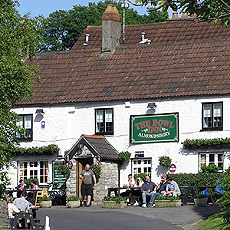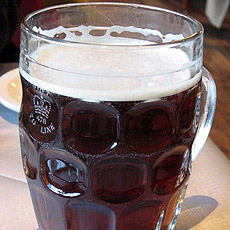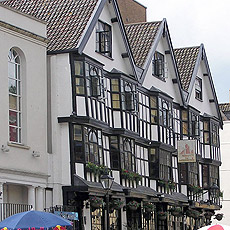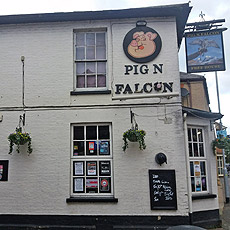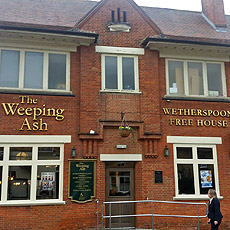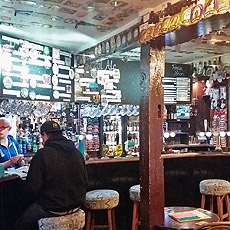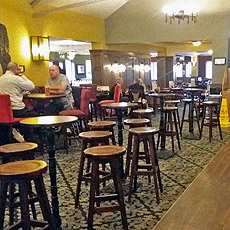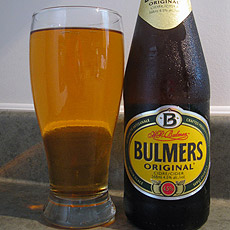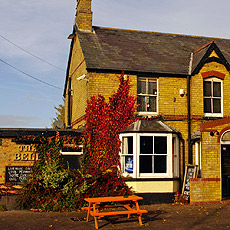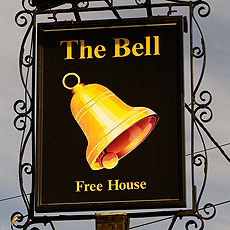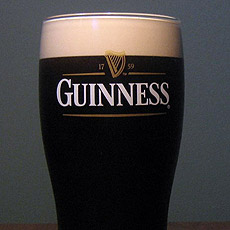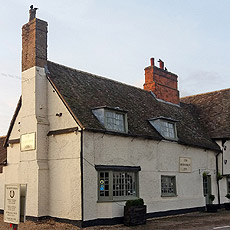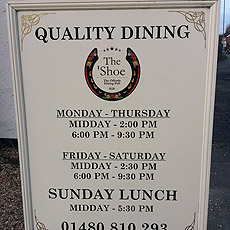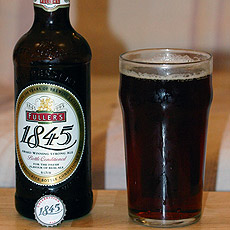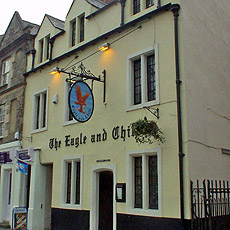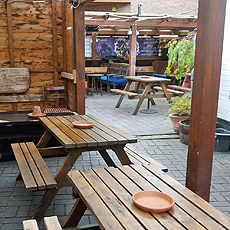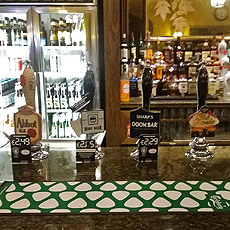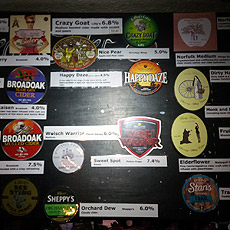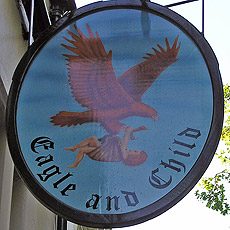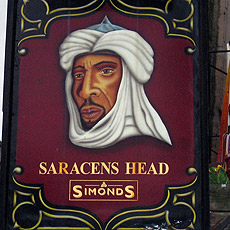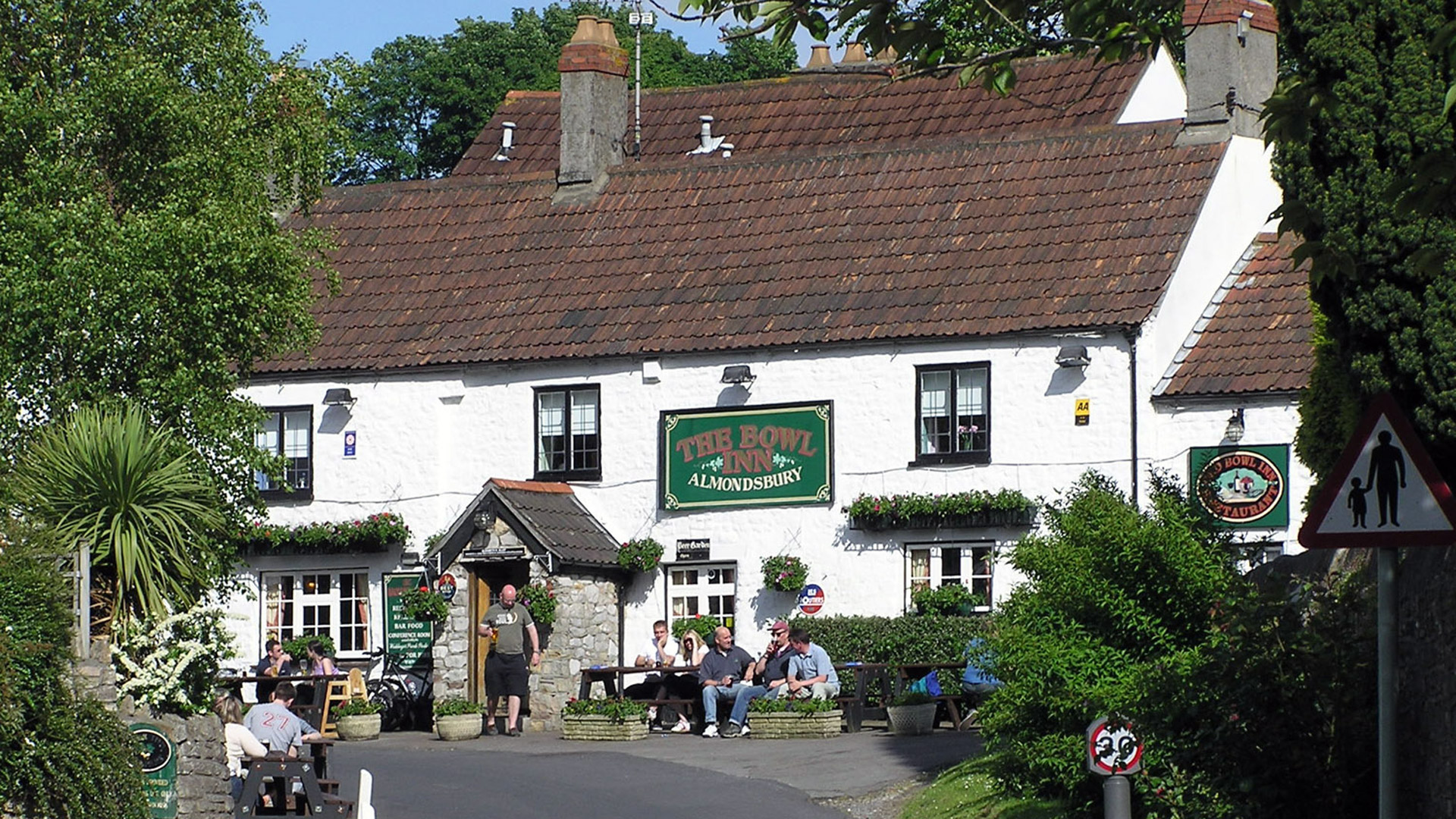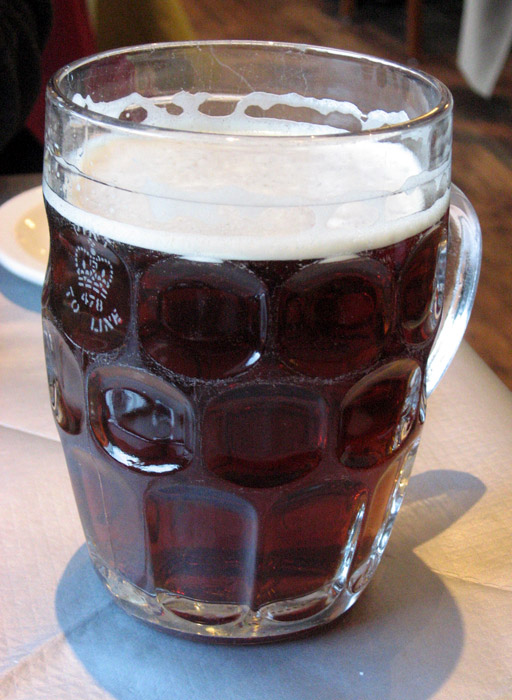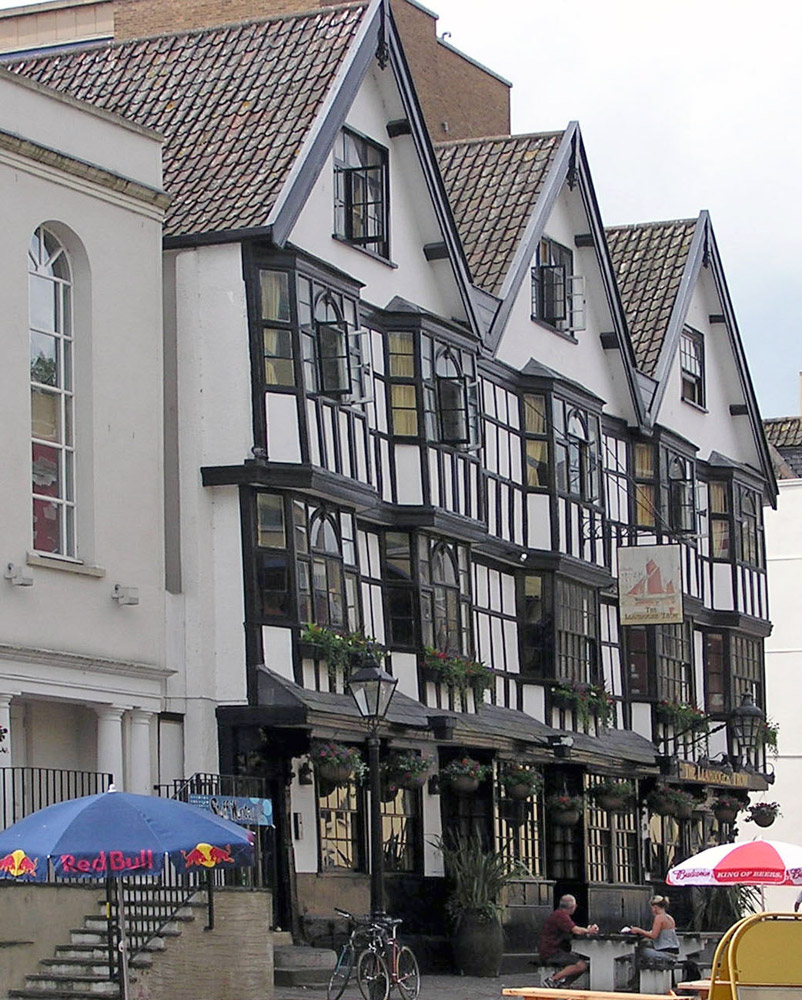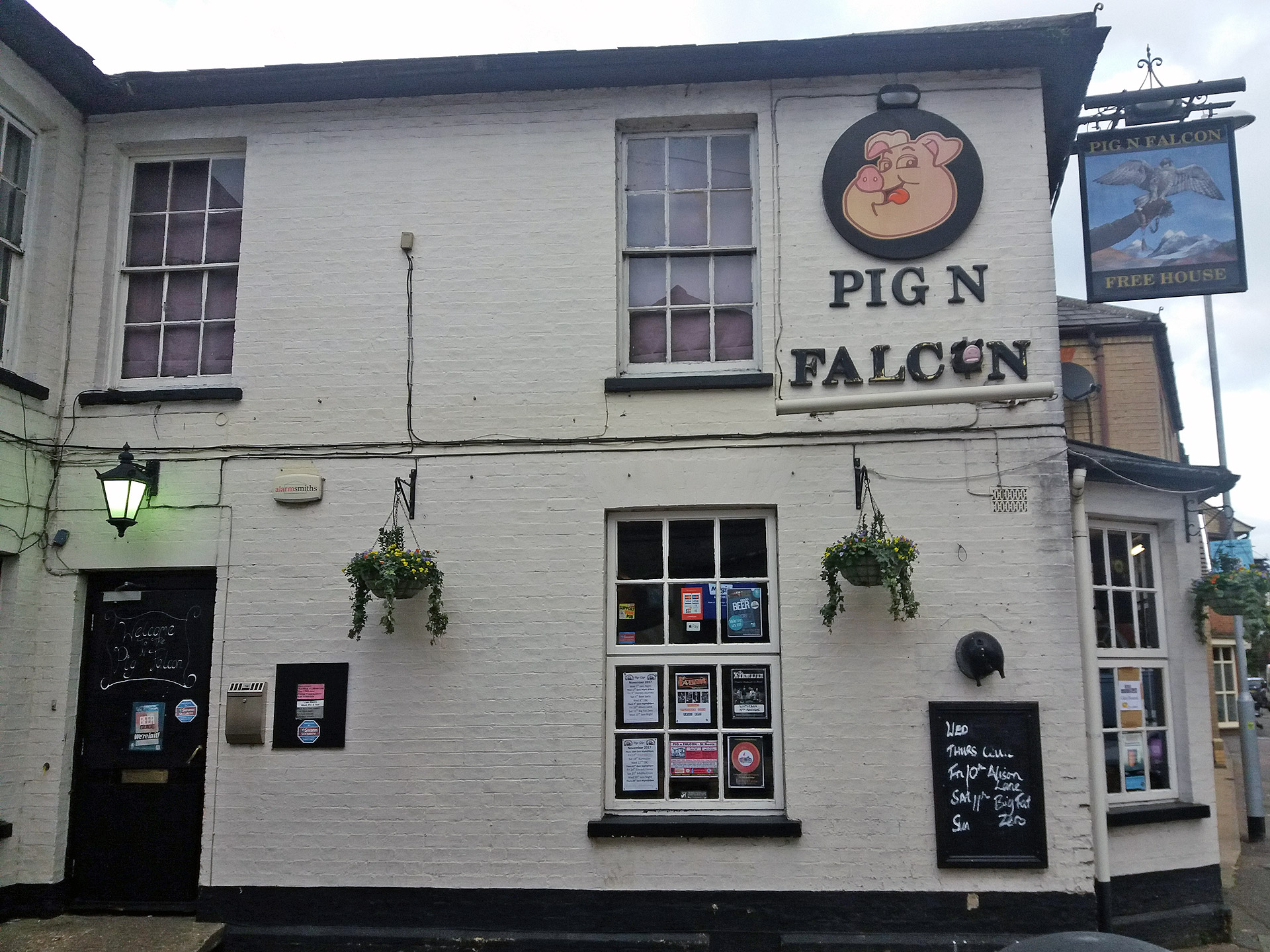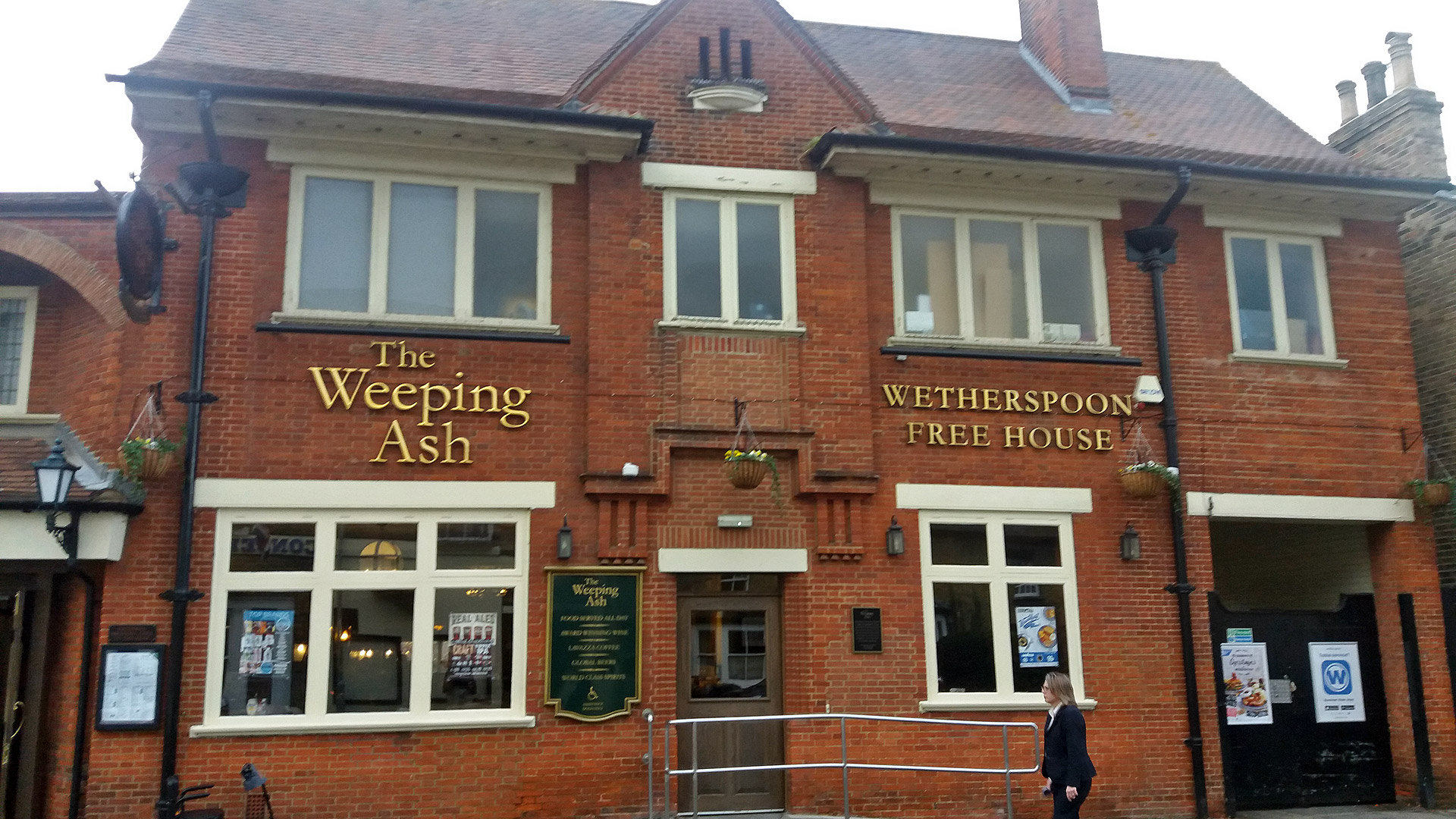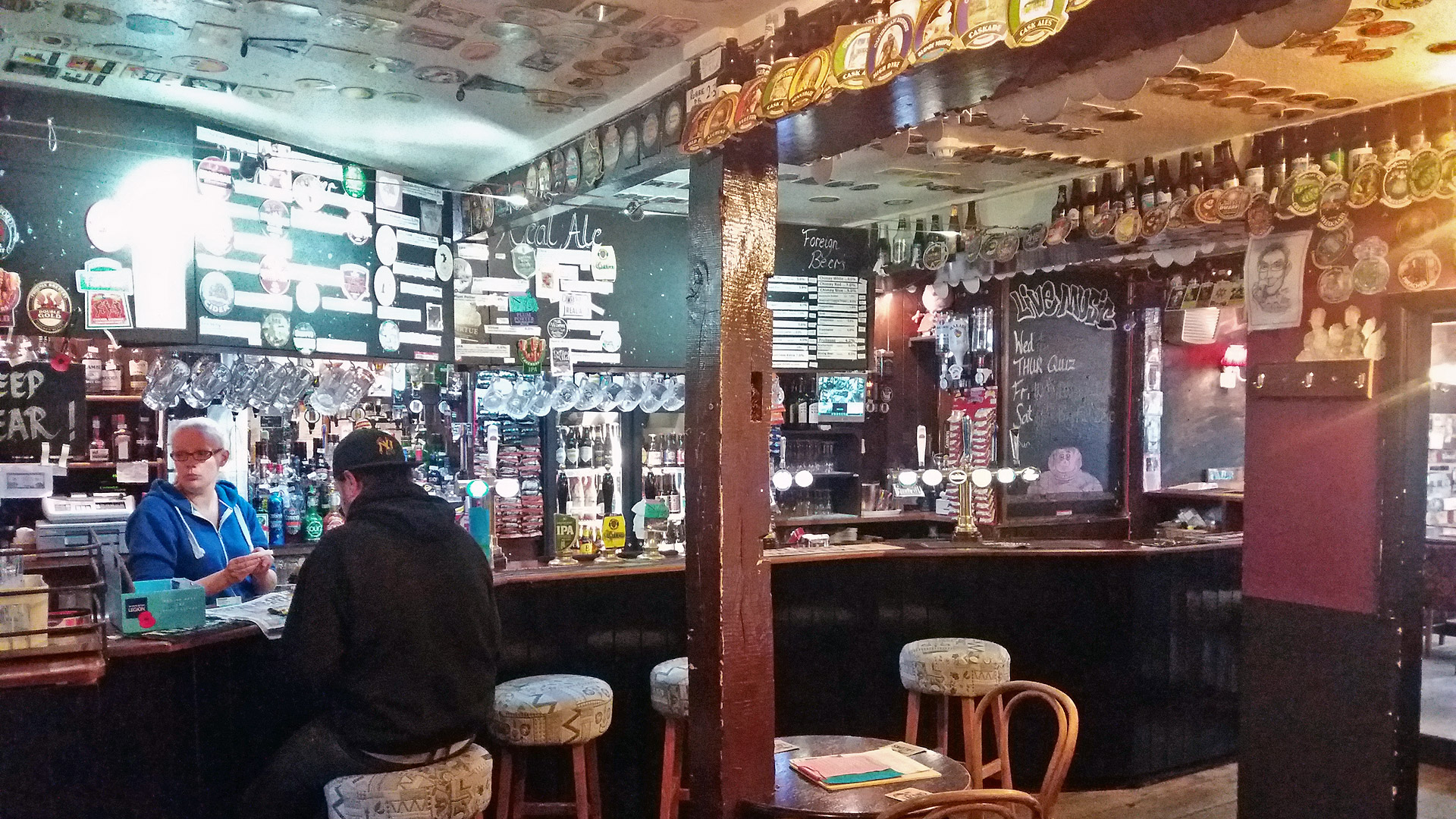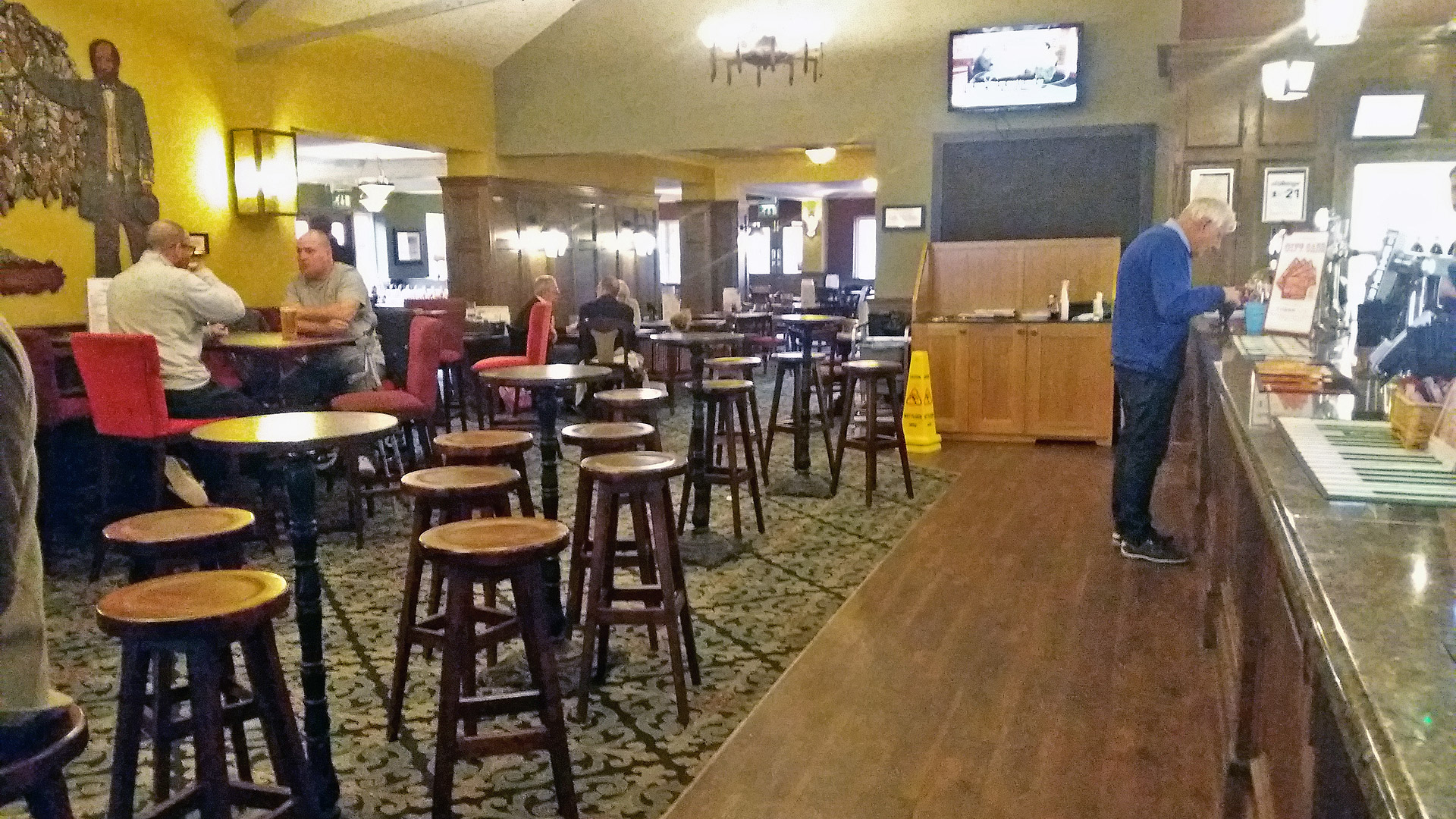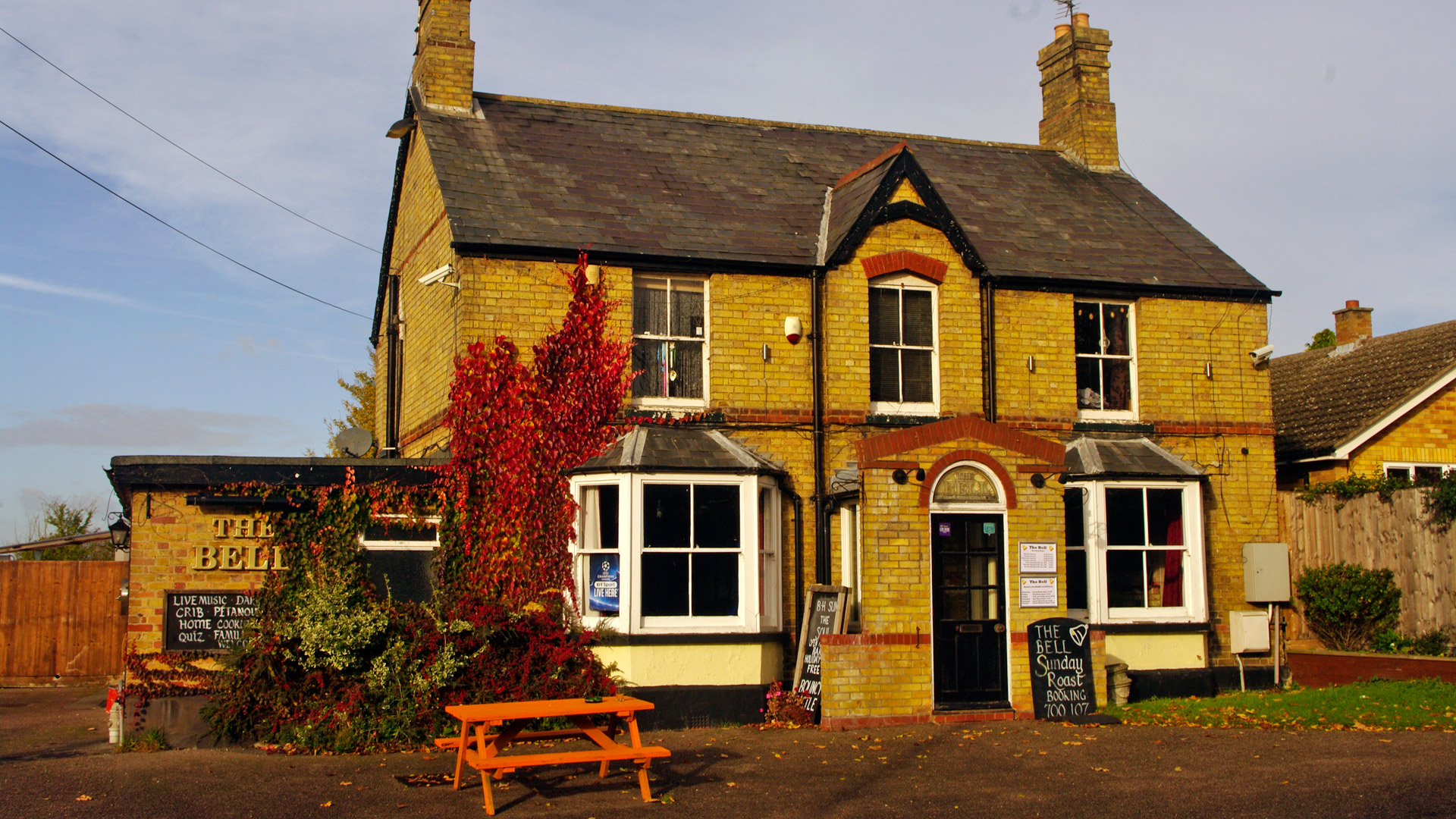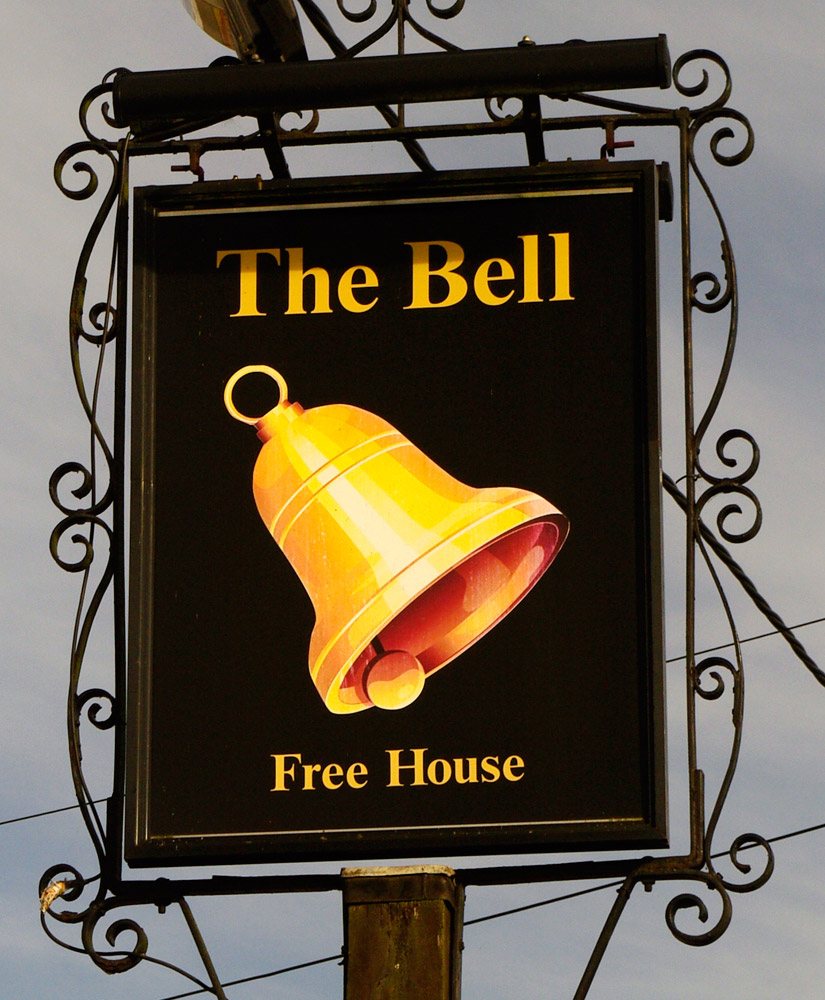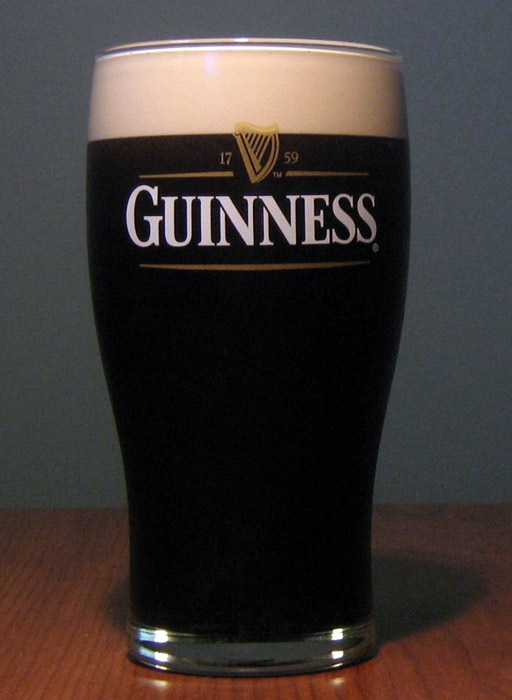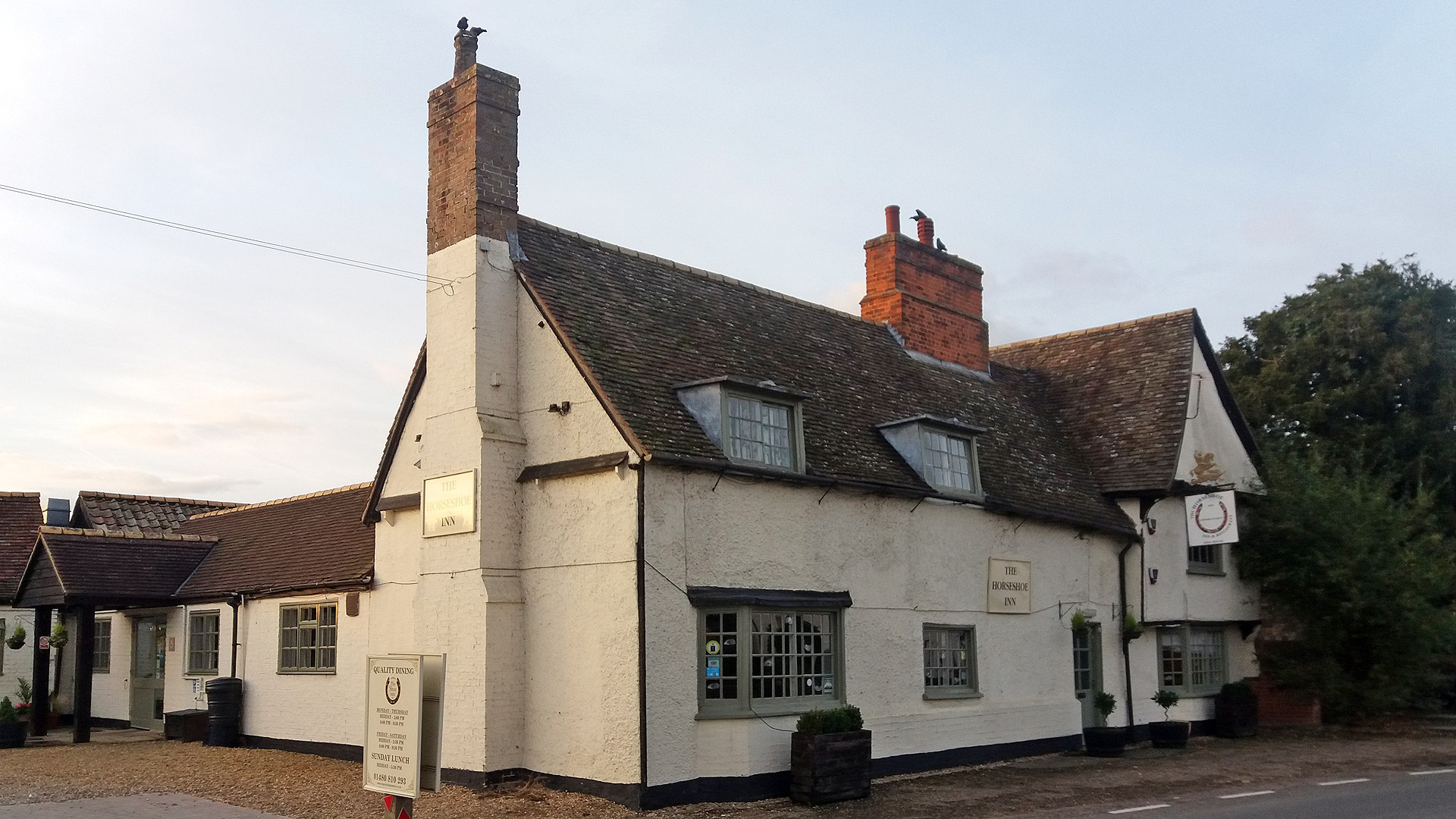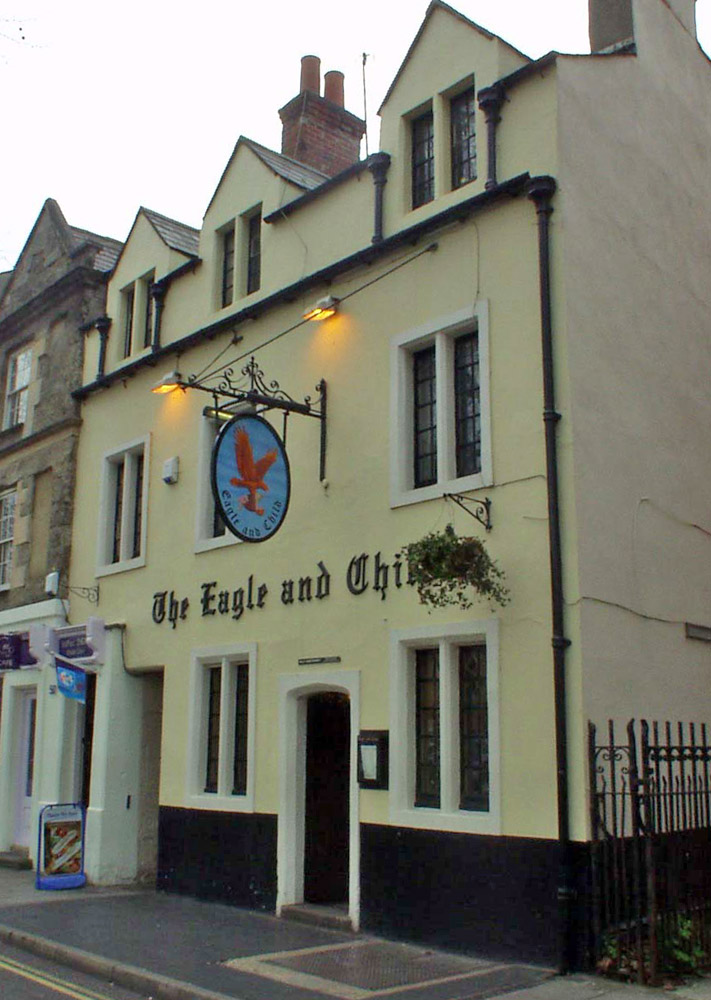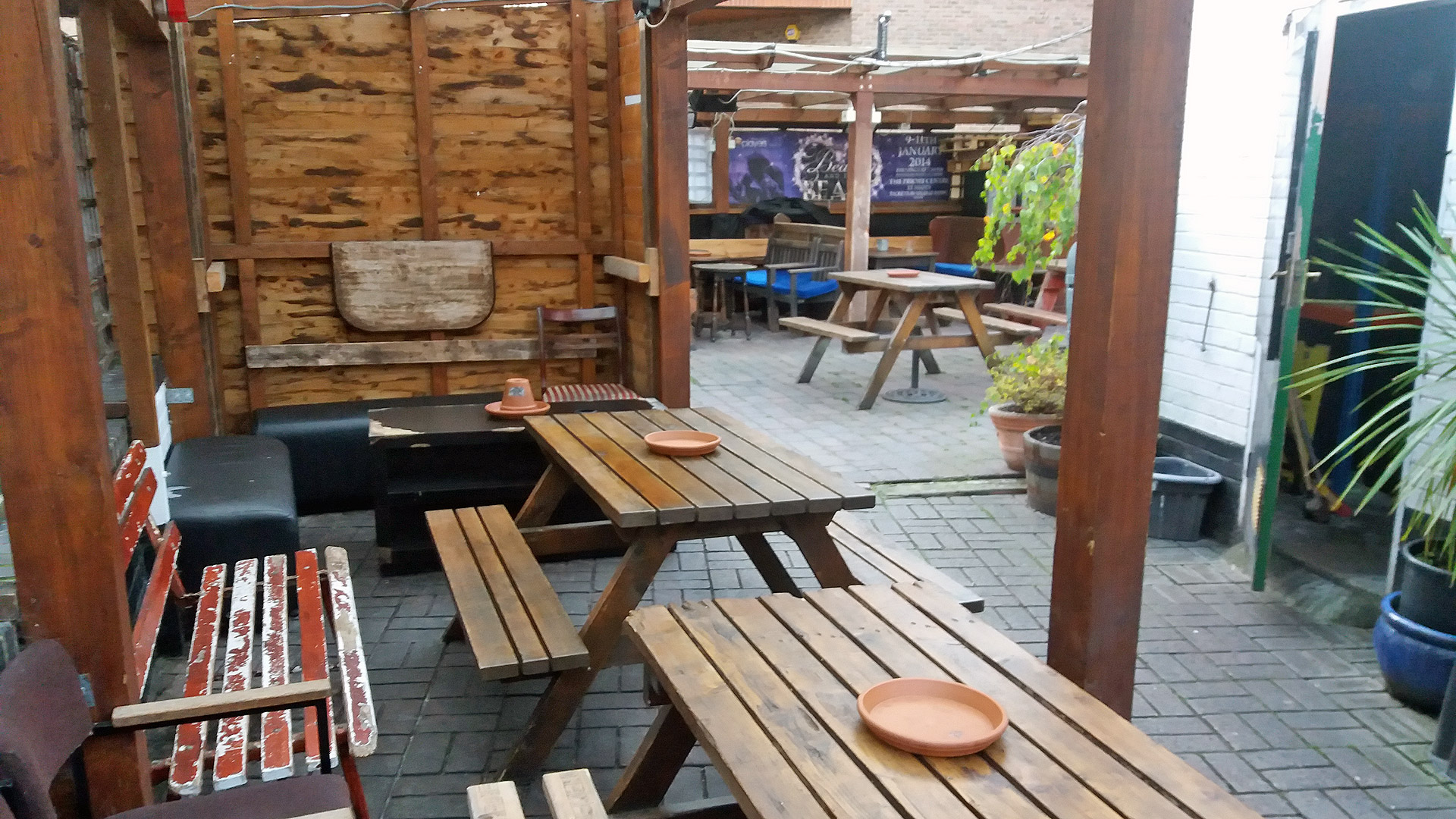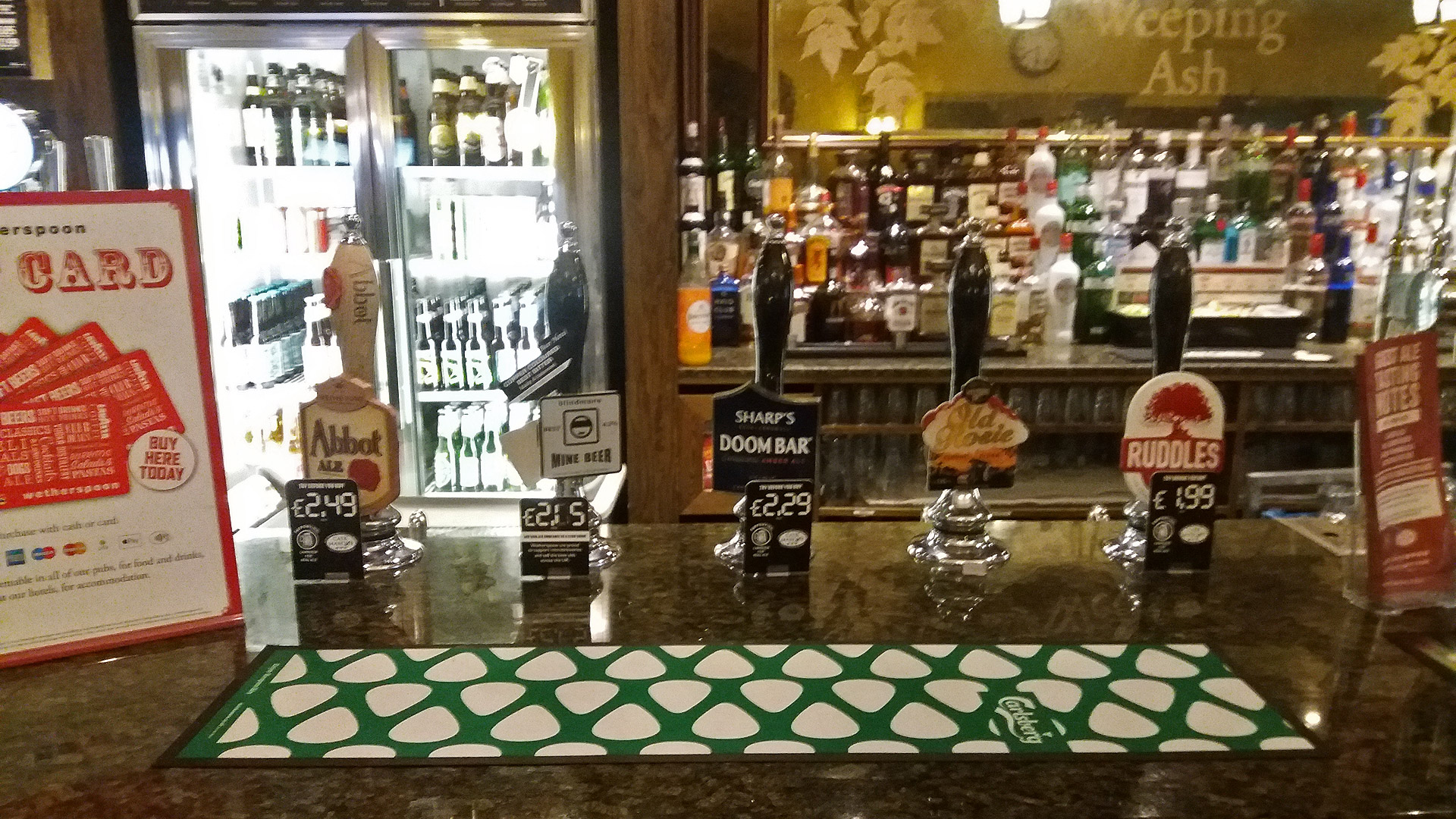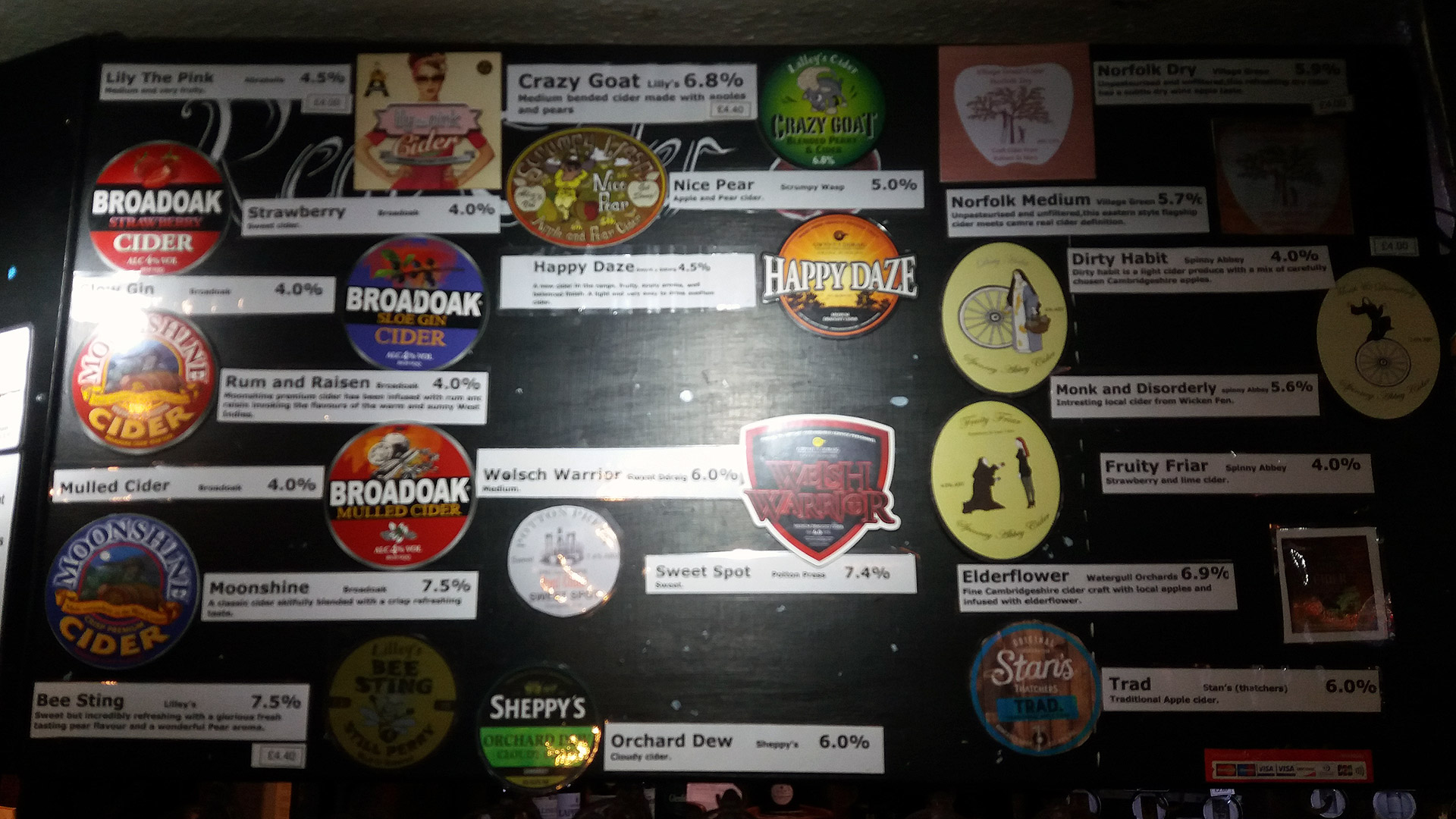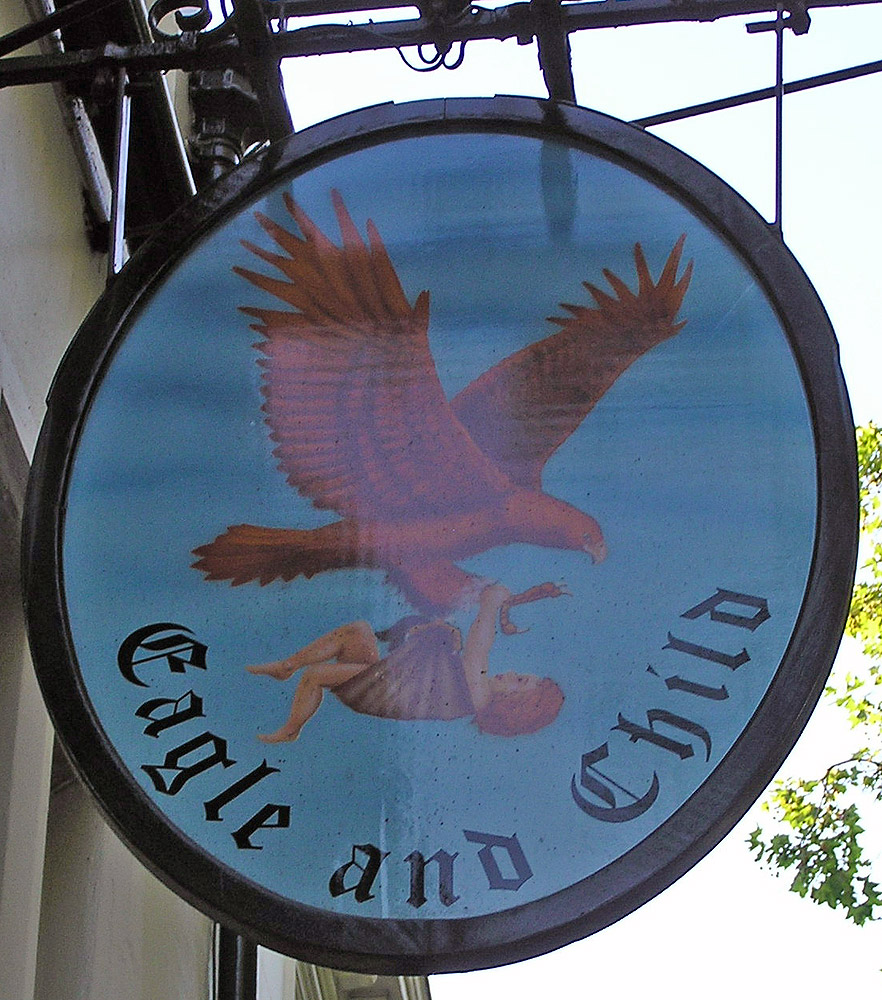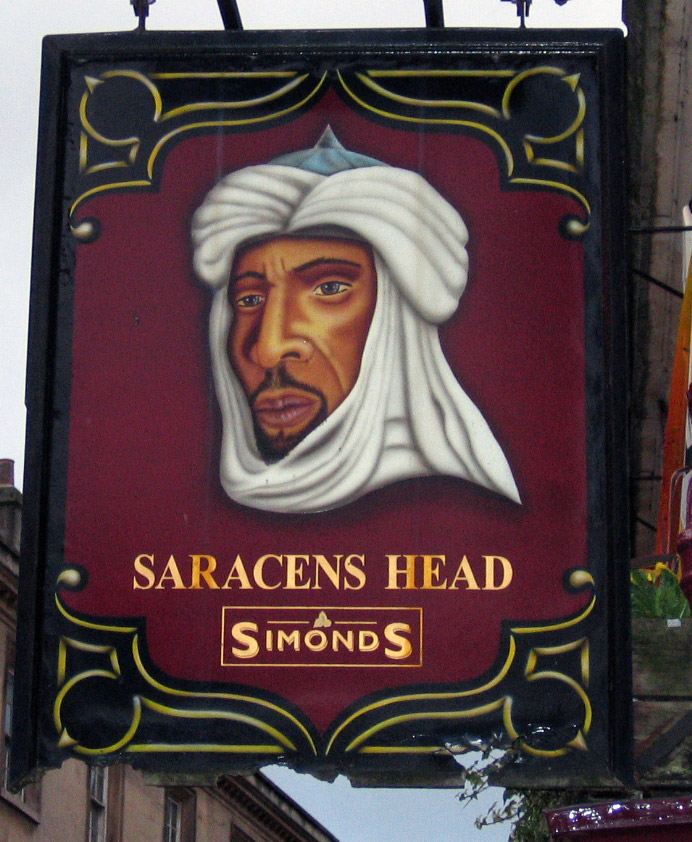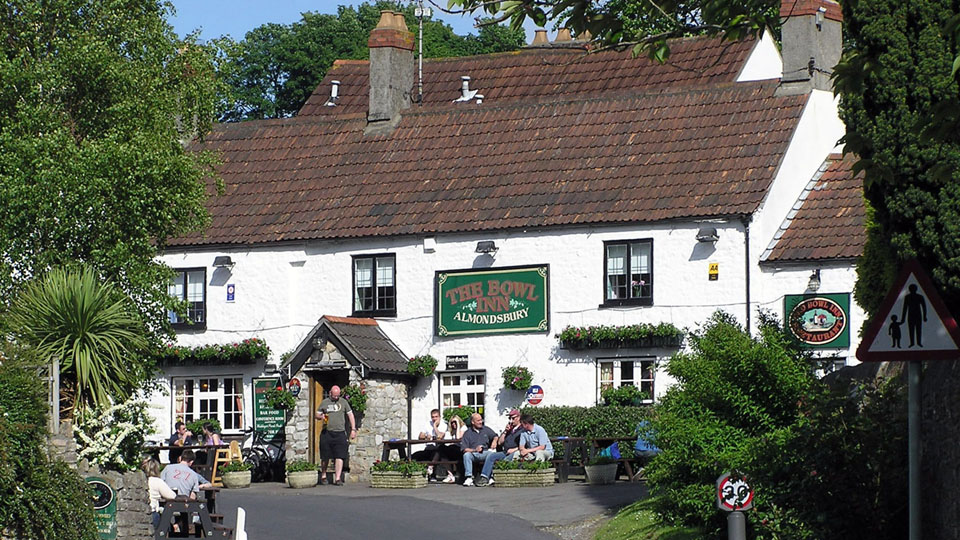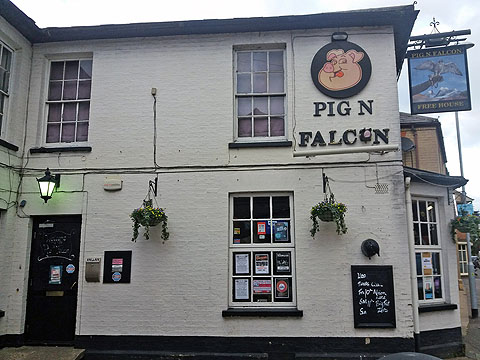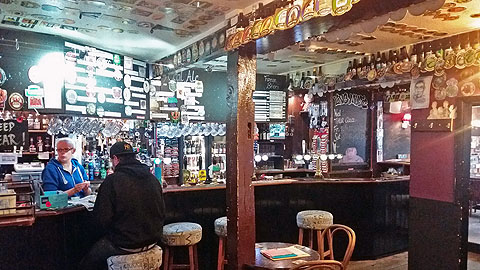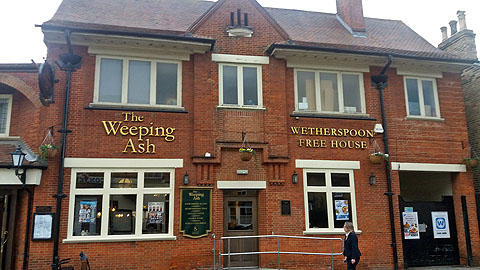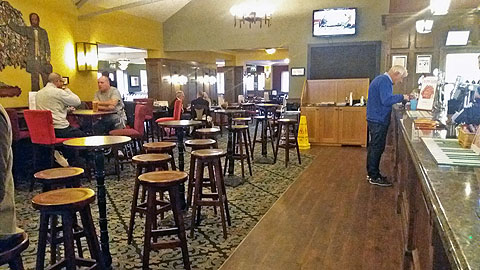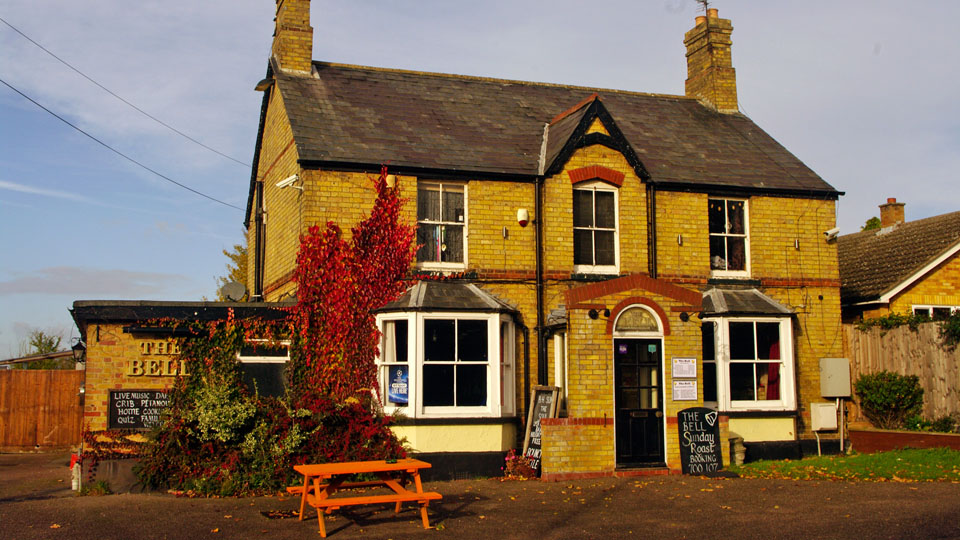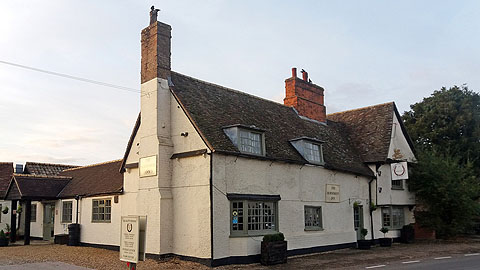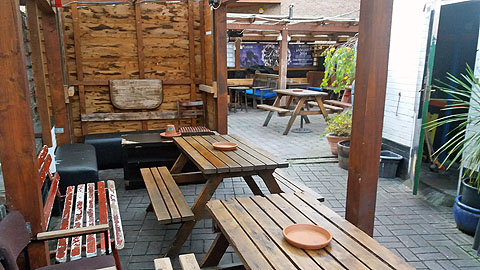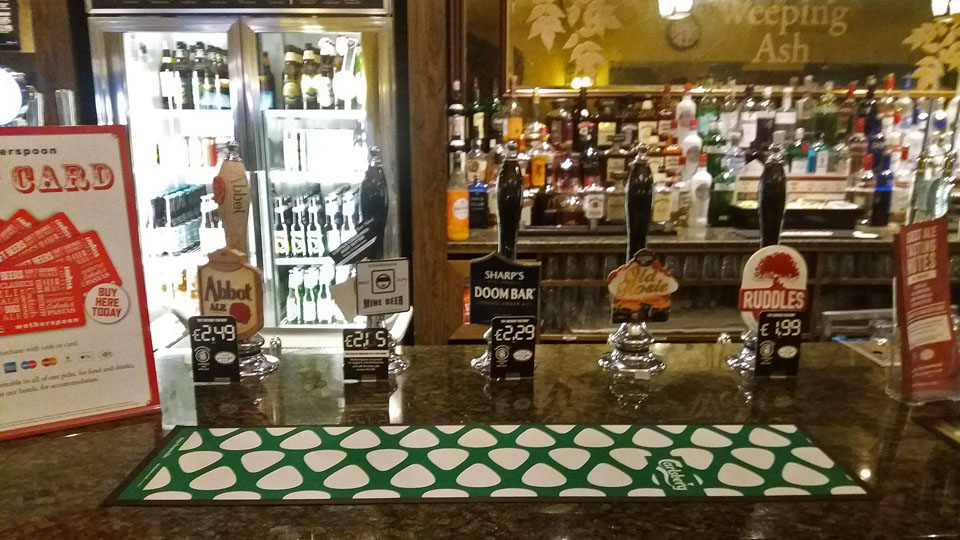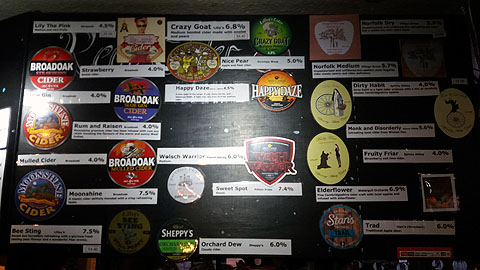British Pub Culture. What happens when you go down the pub for a drink in England? What do you do, what's available, and how does it all work?
British Pub Culture, Pub Etiquette in the UK
Basics:
If you come to Britain you should go to a pub at least once, you may even come to like them and go again. There are over 45,000 of them and wherever you are in a city, town or village, there will probably be at least one not too far away. They can be a focal part of the community or can develop their own community feel by virtue of the people who make it their "local". Bars in some parts of the world can be a bit functional as providers of drinks, in Britain the pub becomes a community space, a lounge where all are welcome.
There are some aspects of pub etiquette in Britain that can be a little confusing to the visitor, in fact it wasn't until I started to write them down on this page that I realised how many there were and how complex they can be. They are designed to enable quick service of quite complex orders in a possibly crowded and busy environment without dithering and inconveniencing others, particularly when nearly everyone is somewhat under the influence of alcohol. Others are to do with the social etiquette of the group you are with and designed to be fair to all while retaining a relaxed and enjoyable atmosphere.
Pubs tend to be more similar to each other in villages as they serve the whole village so they fulfill a similar role which often includes the provision of lunches and perhaps evening meals too, The size of the pub is to some degree dictated by the limited locally available clientele and most probably by the age of the building which may well be a couple of hundred years old or more. Look out for open fires, exposed beams and walls that aren't particularly straight.
Pubs in towns and cities can be more individualistic, there are the traditional pubs similar to those in villages, and a whole range of others, those that have a regular live music night, those that display sports matches on large screens or have loud music and wall-to-wall teenagers and twenty something's on a Friday and Saturday night (you can drink in Britain from age 18). You'll almost certainly find a pub that is to your taste and provides the right sort of ambience.
Alcoholic drinks
Pubs mainly developed through history as places to buy and drink beer and by and large this is what they do today. There are usually several taps behind the bar that serve beer from barrels stored in the cellar and a range of other beers in bottles. The beer on tap, called "draught beer" or just "draught" will usually be cheaper and unless you have a particular taste for a bottled beer, will be better. Pubs will generally have 20+ different beers available, draught and bottled.
How to order a pint of beer in a pub: ask for "a pint of <name of beer> please", if you want a half pint, then it's "a half of <name of beer> please" (drop the word pint in this case), if you don't specify a half, you will get a pint.
What to order in a pub:There are hundreds of different beers available but they fall into three main categories, bitter, lager and stout.
Bitter is the most varied category, it may be labeled as "bitter" or "ale". Most pubs will have a mass produced cheaper bitter on draught, possibly more than one choice. In the better pubs there will also be "cask ales" available and here the real pleasure is to be found for the beer lover. The best beers are those found as cask ales that are locally produced, the closer the brewery the better. There may also be "guest ales" where the pub has bought a cask or two of what they don't usually serve by way of variety. I always go for a local cask ale where possible, even if I've had it tinned or bottled and wasn't so impressed, a freshly poured draught pint from a locally brewed cask is a different beast altogether. Bitter is served at cellar temperature, so cool (10-12C) but not cold like lager and contrary to popular belief, not warm either.
Lager is a pale beer, usually carbonated and served refrigerated, it is what beer is like in much of the rest of the world. Pubs will nearly always have at least one mass produced draught lager that will be the same in any part of the country, it will often also be the cheapest beer in that pub, there may also be alternative more premium lagers on draught, though again they will be mass produced and again the same wherever you are, which you may see as a good thing. Other premium lagers will be available in bottles, often from across the world. To me as someone who is not a lager drinker, they mainly taste much of a muchness and not very strongly of much at all which is why I'm not a lager drinker. It's a good place to start if you're not used to drinking beer, most young adults who start drinking in Britain start on lager.
About half of all the beer drunk in Britain is lager, there is currently somewhat of a move away from this towards more traditional ales and "craft beers", which is what beer used to be, brewed on the premises in individual pubs or the local town for local distribution.
Stout is nearly always available, more often than not as Guinness which is far better on tap than it is tinned or bottled. For my money it is the best of the mass produced beers that are widely available, I know people who aren't particular fans of beer who will drink this when in a pub with friends as much as anything for its predictability. I will choose it if there is nothing else that particularly interests me at the bar in restaurants or hotels with a limited choice. It is quite heavy though and not a great accompaniment to food.
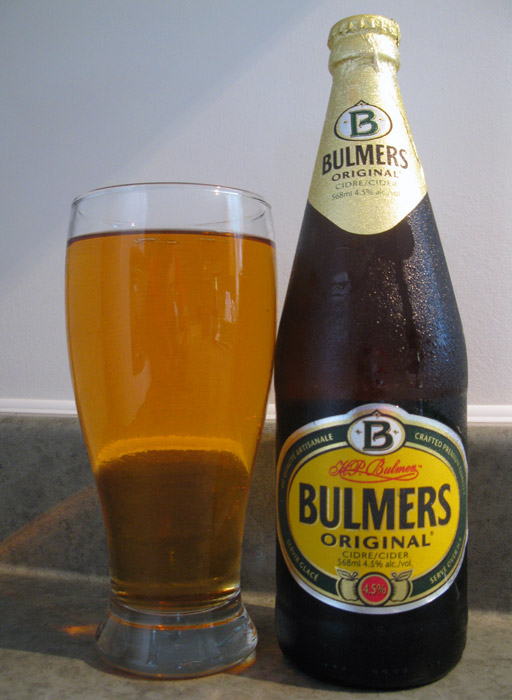
Cider On draught or in bottles
a popular alternative to beer
Cider made from apples is always an alcoholic drink in Britain and about the same strength as beer, it is a fairly popular alternative served alongside beer in most pubs. It comes as sweet or dry and is most often available as a mass produced brand on draught and usually also as bottled alternatives which may be flavoured with other fruits as well. Cider is particularly popular in the apple growing South West where locally produced is more readily available than in the rest of the country. In these cases it may be almost flat (non-fizzy), often cloudy, and can be very strong without seeming it, so take care. It is sometimes referred to as "scrumpy" which is a traditional coarse form of cider in contrast to the clear, fizzy, mass produced versions. Cider can be a good alternative for anyone who isn't keen on beer, do remember it is always alcoholic which can be disguised by the apple taste.
Beers will usually have the alcoholic strength marked on the tap, if they don't you can ask. They are typically from 3% to 6%, this can be useful if you aren't used to drinking and/or feel you won't be able to keep up with your companions, pick a less strong beer and stick to that.
It is normal to drink beer by the pint (568ml, 20 fluid ounces rather than 16 as in the USA), you can also buy it by the half pint which can be good for trying a range of beers, if you don't specify, you will automatically get a pint.
Wine is almost always available by the glass in pubs. In many pubs though, hardly anyone drinks it which means it may be of dubious quality and the opened bottle may have sat around for some time. I suggest you avoid wine by the glass unless in a wine bar or in a pub where it features as more than just a couple of bottles behind the bar.
Spirits are available in variety along with a range of mixers. There is usually a range of whiskies which may become very numerous in Scottish pubs and bars, it is always called whisky and never "Scotch" unless you want to sound like a tourist. Gin has become more popular again recently with greater variety and availability, a pre-meal gin and tonic (G&T) is an old and admirable British tradition. Cocktails are not usually ordered in pubs unless they have a specific menu for them, even if the ingredients are all behind the bar, though if it is quiet, they will probably be happy to oblige, but don't expect fresh fruit and all the shaking palaver.
Age and ID
You must be over 18 to buy alcohol in Britain. Many pubs have a policy of "Challenge 21" or "Challenge 25" where anyone who looks like they might be under 21 or 25 respectively who tries to buy alcohol can expect to be challenged to prove their age, as long as they can prove they are over 18 all is well. Similar restrictions apply wherever alcohol is sold. So if you look young though are over 18 in Britain you should have some ID with you. The ID needs to have a photo, this can be a passport, UK drivers license or something called a Proof of Age Standards Scheme (PASS) card. Other ID can be accepted at the discretion of the establishment.
Spot the Pub
Other countries have a tendency to identify bars and cafes by helpfully having the word "Bar" or "Cafe" in large letters above the entrance. British pubs however don't usually have the word pub anywhere to be seen and it can seem unclear as to whether a building is a pub or not (some are called "Inn" which helps). The thing to look for is the pub sign, a large board about 1m x 1.5m or thereabouts that either hangs above the front door or atop a tall post near the pub at a right angle to the building so it can be seen when walking or driving by. The sign will have the name of the pub and usually a pictorial representation of the name (a historical relic from when most people were illiterate), it might also carry the name of the brewery that owns the pub or have "free house" which means that the pub is free to get its beer from any brewery that it chooses.
Is there Food?
Many pubs will provide food of some kind through the day. In smaller ones there may be little available, just some sandwiches perhaps. All will have salty snacks such as crisps, nuts and pork scratchings though you may have to ask as they are aren't always on display. An increasing number of pubs provide food at lunch time and in the evening, the range and quality of meals provided varies enormously. Some are cheap and cheerful simple offerings to be eaten at the ordinary pub tables, many have a restaurant area and some are more like a large restaurant with a small pub on the premises.
Pubs that serve higher quality food are sometimes called Gastropubs, they can have very high-end restaurants some of which have won Michelin stars and require booking long in advance (and deep pockets).
There is no set way of ordering food in pubs, some will require you to wait to be seated and then have waiter service, in others you find your table first and then give the number (from the table). Many will require you to order your food from the bar and possibly pay in advance, you may then collect the food yourself or return to your table to be served by a waiter. If you want to eat, approach the bar on entering and ask what the system is.
Pub food is commonly inexpensive to mid-range price wise and of at least reasonable quality. The better quality food is usually straightforward traditional dishes such as pies, fish and chips, sausage and mash etc. If the menu is extensive and very varied with food from all around the world, it is best avoided as it inevitably means that the kitchen consists mainly of freezers and microwaves. Don't be put off by what appear to be non-specialist restaurants in pubs. For instance, the pub in my village has a steak night twice a week where they only serve steaks of various kinds, and a fish and chips night on a Friday. The steaks are the best for miles around, better than in some fancy restaurants and the fish and chips at least as good as nearby fish and chip shops.
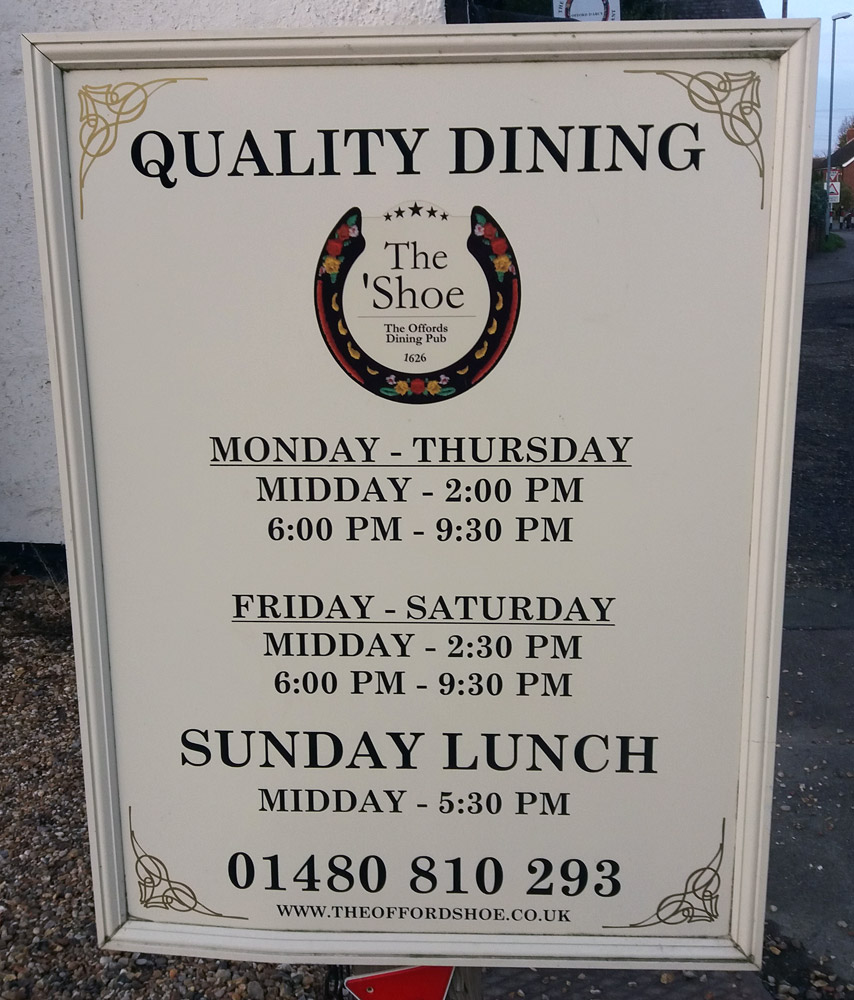
Restaurant Times
Pubs will be open longer than the restaurant,
so you can relax with a drink up to
closing time
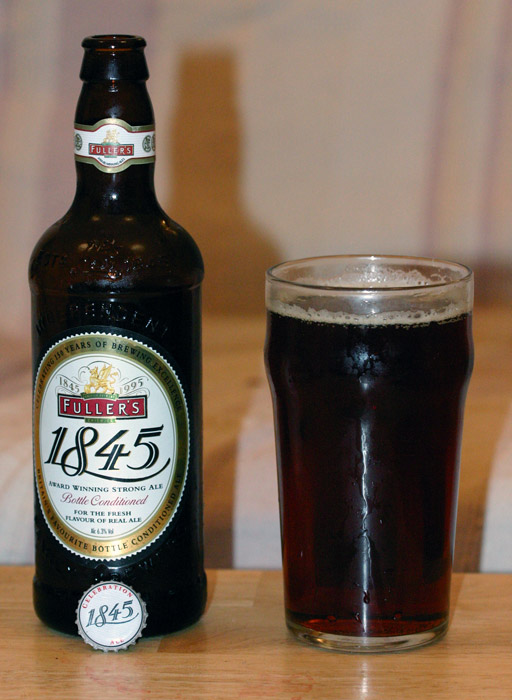
A Bottled Ale
Most
pubs have a wide range of beers, either
on draught or in bottles
Smoking Areas
Smoking has been banned in enclosed public areas in the UK since 2007. Many pubs have an outdoors smoking area which in the summer time can be very pleasant, but if the weather isn't so good can be a bit grim. To make it more attractive for smokers, some pubs make the outdoors smoking area more comfortable by putting in seating undercover with lighting, there may also be outdoor heating during the coldest weather. This of course relies on the pub having an outdoor area to use in the first place, urban pubs may not have such a space and smokers have to go outside to smoke in the street.
Dress Code
Pubs are relaxed places to go, though attempts are sometimes made to stop them being too relaxed or to dissuade the wrong sort of clientele in the evenings and weekends in particular. You will find it difficult to gain entry to most pubs without a shirt or other top on for instance or without any sort of footwear. Others may have a code that doesn't permit tracksuit bottoms, jeans or trainers, these are more likely to be pubs in towns and cities in the evening. You will still be able to find places that don't have these codes, but it can be annoying if you've just walked some distance to visit a particular pub to be turned away at the door, especially if you are with or are meeting friends there. To avoid being turned away by pubs you aren't familiar with, don't wear trainers (sneakers) and don't wear jeans or shorts.
Ordering, Service and Payment
You should assume that all pubs have bar service only as this is the case with the vast majority. If you go in and sit at a table and wait, nothing will happen, maybe eventually someone will wonder why you have come in to sit down without buying anything, but no-one will come over to serve you, there are no waiters serving drinks in British pubs. Bar space is somewhat limited so the usual thing is to first find seats or just somewhere to stand if the pub is very crowded and then send one of the party to the bar often with a helper to bring drinks back.
The first thing you will notice is there is no queue! However, there actually is a queue but it is a virtual one in the mind of everyone at the bar, it is observed every bit as closely as any other kind of queue in Britain. On arrival you should try to be noticed, eye contact and a smile work well, do not call out, snap your fingers, wave or otherwise make an obvious gesticulation, it will be assumed you are trying to queue jump and could lead to your being ignored for longer. Bringing your empty glasses to be refilled signifies your intention and gains brownie points.
Payment in many pubs is now most often made by contactless card, when the pub is busy this saves everyone a great deal of time and effort and in town and city bars at busy times is by far the preferable way to pay. This can pose a problem for the overseas visitor as a card that works without issue at home may not be accepted in the UK and/or the contactless aspect of it may not function as at home. You may also find that you are charged a foreign currency fee at a fixed amount by your bank or card provider which can be a large proportion of low value transactions, so make sure you know what any fees are before you travel. I also suggest you try out the contactless aspect in another environment rather than in a busy pub for the first time as failed transactions drag the process out and lead to frustration for everyone.
Cash is always accepted in pubs, it is always a good idea to carry some as a back-up or as the only way to pay, you won't be refused payment with cash (though avoid trying to use a £50 note in a pub, many don't accept them as they are the most widely counterfeitted notes).
Rounds
The traditional thing to do when out for drinks with others is to buy in a "round", this is known as "getting a round in" or buying drinks for everyone in the group. It is considered ill mannered and decidedly odd for anyone to go to the bar and buy a drink just for themselves if part of a group.
A round of drinks are not gifts, if someone buys you a drink in a round it is expected that you will buy them a drink in the next or subsequent round. If there are many of you and it is clear you will only be getting one or two drinks before moving on this system may break down into smaller groups rather than one person getting drinks for say 5 or more. No-one actually keeps a close eye on things, but people do remember roughly what happened, so if you're always the one who hangs back and never seems to get a round in, it will be noticed. On the other hand, you shouldn't be too generous or insistent in always getting the first round in, you can offer but make sure you back down to the objections of others who have noted what happened in the past, your offer will be appreciated as will your stepping aside to allow others to be generous too.
If you don't want to take part in buying rounds, make your opt-out clear before the first is bought, accepting drinks and not reciprocating will not go down well.
It is expected that everyone in a round will have drinks that are roughly comparable in price rather than having something significantly more expensive than everyone else is drinking, typically it works for drinking pints (of beer or cider).
If you are in a round and finding it hard to keep up, your own round is a good time to sit it out, either make your last pint last longer and don't get yourself a drink or just ask for a glass of water (free) or a soft drink which will also help hydrate you and keep the hangover at bay. Asking others to get you half a pint or a soft drink may get you what you want or it may more likely result in another pint of what you were drinking with the encouragement to "get it down yer". Most Brits will know their limit and be able to pace themselves, 3 to 4 pints of 5% beer will be readily dealt with, this may not be the case if you aren't used to it.
An alternative to the round is to have a "pot" or "kitty", this is where one of the group holds money from everyone and uses it to buy rounds for all. Everyone puts the same amount of money into the kitty and then it is topped up if required throughout the evening. This is usually only used for what will be a protracted drinking session, probably on pub crawls.
A Toast
Toasting with drinks is not something that happens very often at all in British pubs. If it does, it is most likely to be a special occasion such as a birthday, a new job, engagement, a new baby etc. and is quite a low-key affair. There are no speeches and the clinking together of glasses is done quietly and without any ostentation. If it occurs at all it is something that will happen with the first or possibly the last drink of that session. You could raise your glass and say "Cheers" in a voice slightly louder than normal conversation, the others will join in and chink glasses together gently, usually at the top of the glass, though as often there will be no chinking. You could make a short statement such as "Here's to a good evening", "To new friends", "To good company" or similar. While your effort will be appreciated, making such toasts is not really what the ordinary British do very often though so don't be surprised if you're the only one.
Last Orders
Shortly before the pub closes, there will usually be a bell and a cry of "Last orders!" which signifies that there are about ten minutes left in which to buy drinks before the bar shuts, the pub itself will close about 20 minutes after that, this is called "drinking up time" after which you will be asked to leave whether you have finished your drinks or not.
The Pub Crawl
An evening (or day) which involves having a single drink in a number of pubs in turn. Pub crawls are usually notable by their lack of planning and structure, a group of friends or work colleagues will meet in a particular pub at an agreed time with the intention to visit several others on foot over the next few hours. Suggestions of where to go next are discussed at each pub and this is often the extent of the planning.
When most people have finished their drink, there will be the call for the slower ones to drink up and set out for the next pub. In busy towns and cities on Friday and Saturday nights there will be any number of groups of people moving fairly randomly from pub to pub on pub crawls.
The time between pubs is almost as important as the time in pubs, allowing for alcohol-enabled relaxed conversations that you may not be able to have in a noisy and crowded pub. By their nature, pub crawls will be pretty loud and boozy affairs though can be civilised or not according to those taking part.
The almost pub-crawl - many nights out may become almost a pub crawl without the explicit description as groups will move on from one to another after one or two drinks or end up by settling in one pub for the rest of the evening.
Tipping
It is NOT expected to tip, in fact it is quite unusual to tip in pubs, if you wish to do so then when paying the bill, the phrase to use is "...and one for yourself", the price of a cheap drink will be added as a tip to the bill, alternatively you could say "keep the change" assuming you know roughly how much the change is. If you do this, you will typically do it just once while you are in the pub and not for each round. There might be a tip-jar on the bar for you to add a pound or two or some loose change.
Don't expect the bar person to actually have the drink you got them (they are at work after all), sometimes they might and even then most probably later on, when their shift is over. More likely they will take the cost of the drink in cash as a tip rather than as an actual drink.
Your server will be receiving a fair wage for doing their job, they are not dependent on tips for their salary, if they happen they are the icing on the cake.
All pictures on this page as a slideshow
Picture credits: Pint of Guinness - Koolgiy, Creative Commons 3.0 Attribution share alike unported license / Pint of 1845 ale - Tom k & e, Creative Commons 3.0 Attribution share alike unported license
